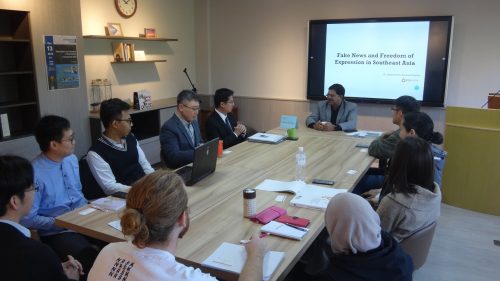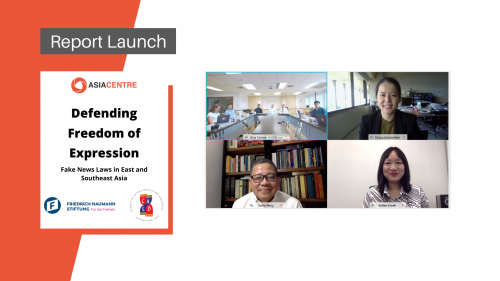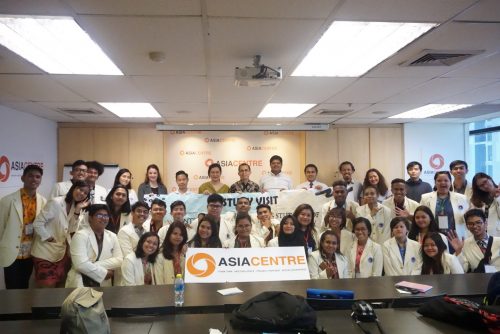After the Second World War, Japan’s search for a guiding framework for renewed relations with Southeast Asia led to the adoption, 32 years after the end of the war, of the Fukuda Doctrine on 18 August 1977. The doctrine had at its core a “heart to heart” approach to its foreign policy in the region. However, forty years later, at Asia Centre’s roundtable discussion on Japan-ASEAN Relations in a Multipolar World, it became clear that Japan needed to develop a human rights dimension to its foreign policy with Southeast Asian countries in order to distinguish itself from other major Asian powers, such as China and India, who also are increasingly engaging with the region.
 The doctrine’s goal of a “heart to heart” relationship came on the heels of significant anti-Japanese protests across Southeast Asia in the preceding years over unsavoury Japanese business practices. Japanese companies, and American, had started to go offshore in the late 1960s and Southeast Asia was a natural destination for their companies. However, large protests against Japanese companies at the time highlighted problems with human resource practices and the lack of skills, knowledge and technology transfer to the local communities. The benefits of the economic relationship appeared to be one-sided. An ‘ugly Japanese’ image resulted and easily so given the ravages of war-time occupation between 1941 and 1945. The latter, as noted by Dr. Teewin Suputtikun of Chulalongkorn University, was addressed in the Fukuda Doctrine by announcing a non-hegemonic, non-military role, with the added reassurance of Japanese domestic constitutional constraints and external constraints through the Japan-US Security relationship. The Doctrine enabled a greater role for Japan in the Cold War competition between the US and the Soviet Union by helping Southeast Asia through increased trade, development assistance and a “heart to heart” relationship.
The doctrine’s goal of a “heart to heart” relationship came on the heels of significant anti-Japanese protests across Southeast Asia in the preceding years over unsavoury Japanese business practices. Japanese companies, and American, had started to go offshore in the late 1960s and Southeast Asia was a natural destination for their companies. However, large protests against Japanese companies at the time highlighted problems with human resource practices and the lack of skills, knowledge and technology transfer to the local communities. The benefits of the economic relationship appeared to be one-sided. An ‘ugly Japanese’ image resulted and easily so given the ravages of war-time occupation between 1941 and 1945. The latter, as noted by Dr. Teewin Suputtikun of Chulalongkorn University, was addressed in the Fukuda Doctrine by announcing a non-hegemonic, non-military role, with the added reassurance of Japanese domestic constitutional constraints and external constraints through the Japan-US Security relationship. The Doctrine enabled a greater role for Japan in the Cold War competition between the US and the Soviet Union by helping Southeast Asia through increased trade, development assistance and a “heart to heart” relationship.
A deepening trade and investment relationship followed during Japan’s peaceful rise since  then.Japan was the number two trade partner for the 10 members of ASEAN in 2016 and a major source of FDI in the region. While large companies, such as Toyota, have been firmly entrenched across the region for some time, the majority of newer investment features small and medium sized enterprises. All are attracted to the prospect of an increasingly integrated ASEAN Economic Community.
then.Japan was the number two trade partner for the 10 members of ASEAN in 2016 and a major source of FDI in the region. While large companies, such as Toyota, have been firmly entrenched across the region for some time, the majority of newer investment features small and medium sized enterprises. All are attracted to the prospect of an increasingly integrated ASEAN Economic Community.
With such deepening business ties, there is a logical concern in Japan for peace and security in the ASEAN area, as noted by Dr. Takashi Tsukamoto of Thammasat University. Moreover, he noted a demand in the region for Japan’s services as a security provider on hard security issues in the context of an increasingly assertive Chinese presence in the South China Sea. Japan will have taken note of China’s ‘One Belt, One Road’ initiative that seeks to tie ASEAN’s economies closer China’s economy.

The adoption of a human rights dimension to Japan-ASEAN economic and business relationship will provide greater traction for Japan in this regional political economy. Ms Akiko Sato from the United Nations Development Programme Regional Office in Bangkok noted concerns related to environmental degradation and labour practices resulting from Japanese firms’ business operations in Southeast Asia. Japan, as other powers, also needs to pay heed to ASEAN’s 2007 Charter, which adopted norms of democracy, rule of law and the promotion and protection of human rights.
In this context, the principles of protection, respect and provision of remedies as outlined in the UN Guiding Principles on Business and Human Rights will likely feature increasingly in the Japan-ASEAN relationship. States have a duty to protect human rights, corporations have a duty to respect and victims of violations have a right to a remedy. The Human Rights Council unanimously endorsed the Guiding Principles in 2011. Japan also announced in 2016, that it intended to elaborate a national action plan in this area in the coming years. An effective plan will ensure sound, ethical and rights-based business practices by Japanese firms operating abroad.
Asia Centre aims to explore further the theme of business and human rights through its July 2018 international conference on human rights in Southeast Asia, its policy papers and in future roundtable discussions.
You can view photos from the event here. This event was held with the support of the Japan Foundation, Bangkok.



